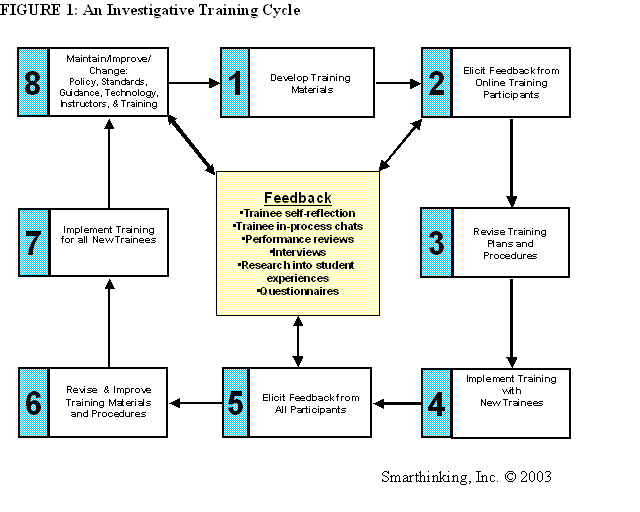How Do You Ground Your Training?
Sharing the Principles and Processes of Preparing Educators for Online Writing Instruction
Investigation
The principle of Investigation addresses "the need to establish mechanisms within training programs that allow for ongoing research and development at both the individual trainee and broader programmatic levels" (Hewett and Ehmann 6). We agree with John Elliott (49) that systematic empirical investigation can help professionals to improve practice. An iterative process of improving one's training program is one result (see also Ehmann; Hewett).
Among the characteristics of employing investigation as a training principle are:
Adoption of a systematic, empirical research strategy. We elected to look at our own practice using a version of "action" research (see, for example, Schwandt 2). Useful approaches include generating data through:
- Observation,
- Interviews and surveys,
- Meta-cognitive exercises for trainees as well as trainers,
- Synchronous trainer-trainee discussions,
- Qualitative feedback from individual trainers,
- Analysis of archived training sessions, and
- Case studies of one's practice as revealed by participants, such as through questionnaires, surveys, and other such accountings.
Willingness to examine the less successful elements of one's program. Rosalie Holian tells us that mistakes and "surprises" also can teach us (2; see also Schön). When we think about it, an understanding of mistakes is as necessary to an individual instructor's growth and to a program's development as success. In essence, any training program, however well planned, has spontaneous and unexpected moments that occur from the convergence of individual trainers and trainees who respond individually to the material and activities.
Specific data collection questions and goals. Investigation requires that participants determine what kinds of information might best serve to improve the program in its next iteration. For example, in our work together, we decided that some critical concerns include:
- What the instructor-trainees are learning,
- What instructor-trainees need and want to know about the pedagogical theories they are applying through technology,
- Which types of activities are most helpful to the progress and professional development of instructor-trainees, and
- How instructor-trainees want their progress and the training to be evaluated.
However, other concerns that may influence training and professional development also emerge and should be considered for study. For example, pertinent to online instructor training, Hewett has been investigating the language that online instructors use in their written commentary and how those choices might influence students' revision choices (see “Asynchronous” and “Synchronous”). Ehmann Powers has been investigating how faculty attitudes influence online teaching and learning, as well as the potential convergence of artificial intelligence and online writing instruction (see ” An Empirical Investigation”).
Using the data to improve training and to develop stronger online instructors. We think that the process of transitioning from the traditional to the online environment is not a straightforward one. It can create feelings of frustration, uncertainty, and self-consciousness in both experienced and new online instructors (see also Blythe; Dufflemeyer; Eldred and Toner; Walker). While such affect is to be expected when learning to teach in a different environment, one function of investigation is to provide practical strategies that offset discomfort where possible, and that help trainees to use their more challenging experiences as positive and change-making learning experiences.
Sharing the data, as useful, with the online instructors involved in the training program. Because we think that supervisors, trainers, and trainees actually are “collaborators" and partners in any training program, we seek some kind of sharing process where informed "debate, discussion, and evaluation of the training process" can occur (Hewett and Ehmann 8-9). Ultimately, such collaboration is empowering to the program design and to the individual instructors involved.
Thus, Investigation can emerge as an iterative process, as Figure 1 shows.

